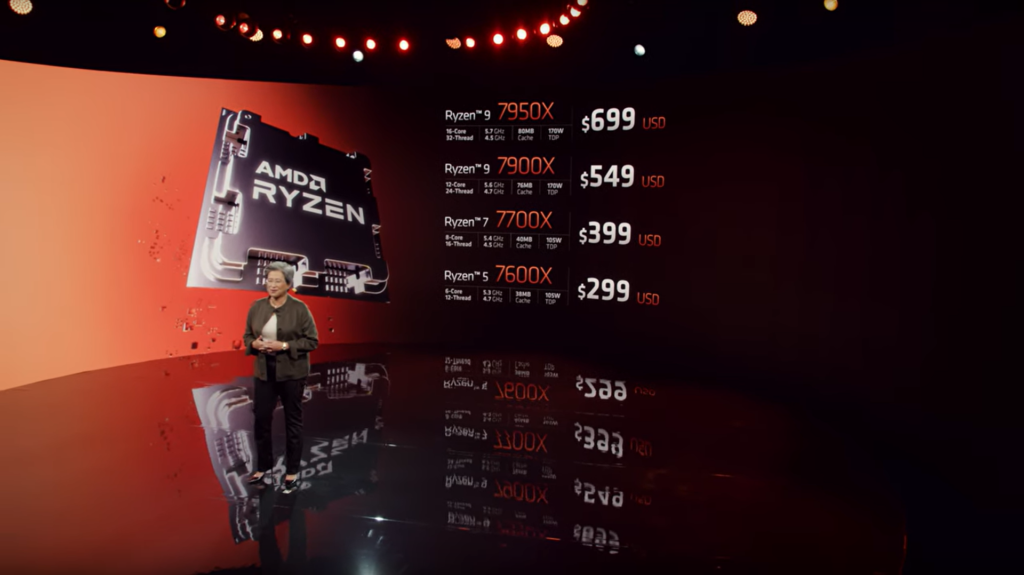The AMD Ryzen 5000 series, at its launch, was the fastest CPUs for PCs in the world at the time. At launch, Intel did not even have a proper answer to AMD’s best offerings even with their 11th generation CPUs. Their 12th generation Core CPUS’s are something special though and claimed the throne as the best CPUs for Windows 11 and gaming at its time.
The AMD Ryzen line upheld up a few key advantages still over Intel’s best offerings. One of those advantage is that AMD’s offerings was still compatible with chipsets that were a few years old. It supported the first wave of PCIe Gen 4.0 devices before Intel could even hop on the bandwagon. Of course, Intel’s 12th generation CPUs works almost exclusively with DDR5, so there is that.
Now, there is this, the Ryzen 7000 series that just launched. No, they did learn how to count. The Ryzen 6000 series of CPUs are laptop CPUs.

The new Ryzen then, the fastest gaming chips in the world, they say. The recipe has not changed all that much with the newer CPUs. There is the fact that it is technically the most advanced chip made for the PC in the modern world. It is built with 5nm process now, which means there are more transistor count on the chips compared to what you get from the Ryzen 5000 chips.
The core count has not changed all that much though. At launch, the Ryzen 5 7600X packs six cores while the top end Ryzen 9 7950X packs 16 cores. We are guessing that the most popular option out of the four Ryzen 7000 models launched would be the Ryzen 7 7700X with eight cores and 16 threads.
The new generation Ryzen processors with Zen 4 are quite a bit more power hungry this time round too. The more budget conscious option, the Ryzen 5 7600X’s rated TDP is at 105W, the same TDP rated for the Ryzen 9 5950X at launch. While you might attribute the higher power draw to the increased transistor count thanks to 5nm process, it could also be the higher clock speeds of the new Zen 4 CPUs. The Ryzen 9 7950X, for example, clocks at 4.5GHz while the Ryzen 9 5950X clocks at 3.4GHz.
Instead of Zen 3+, AMD went straight for Zen 4 with the new Ryzen 7000, rightfully so. Thanks to smaller transistors as well, the newer generation processors will generate less heat, which would explain the higher clock speeds too. At the same time, Zen 4 will be all about DDR5 instead of support for DDR4, as well as PCIe 5.0.
With the new chip as well, they are finally retiring the AM4 socket and embracing a new generation of socket for the next few years at least until 2025. They call it the AM5 and the roadmap is pretty straightforward. The new AM5 platform will be exclusively DDR5 platforms with a planned update to PCIe 5.0 eventually.
On paper, the AMD Ryzen 7000 seems like a leap in performance over the older chip. The top-of-the-line AMD Ryzen 7970X delivers 15% more performances across popular games over the older Ryzen 5 5950X in 1080p resolution. The biggest performance leap is across content creation capabilities though, at 40% average improvements over the older generation CPU. The higher performances can also be contributed to the much faster than before.
AMD’s new line-up of Ryzen 7000 processors will be available 27th of September 2022 onward. That is not necessarily when Malaysia will see the first chips hitting the market. Still, prices start at US$ 299 (MYR*) and tops out at US$ 699 (MYR*) which is about the price of the previous generation Ryzen CPUs. For more information on the next generation AMD Ryzen 7000 CPUs, you can visit their website.




















